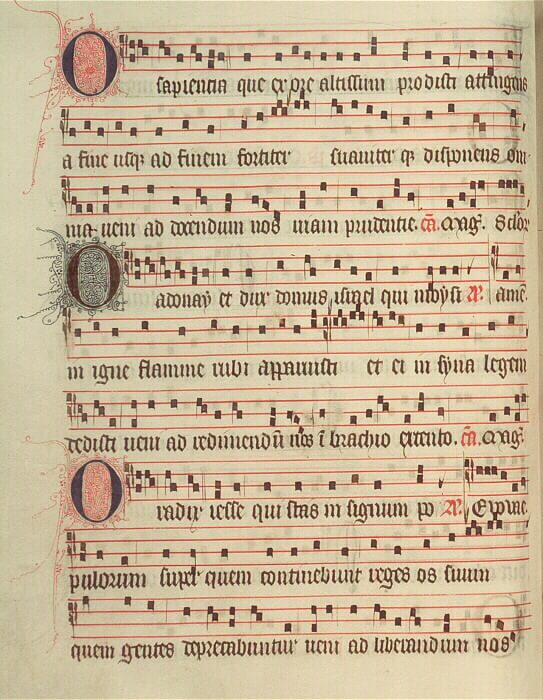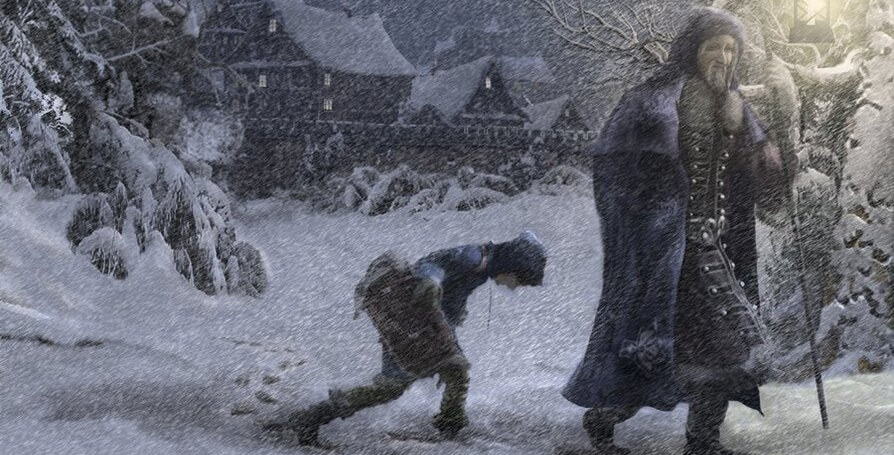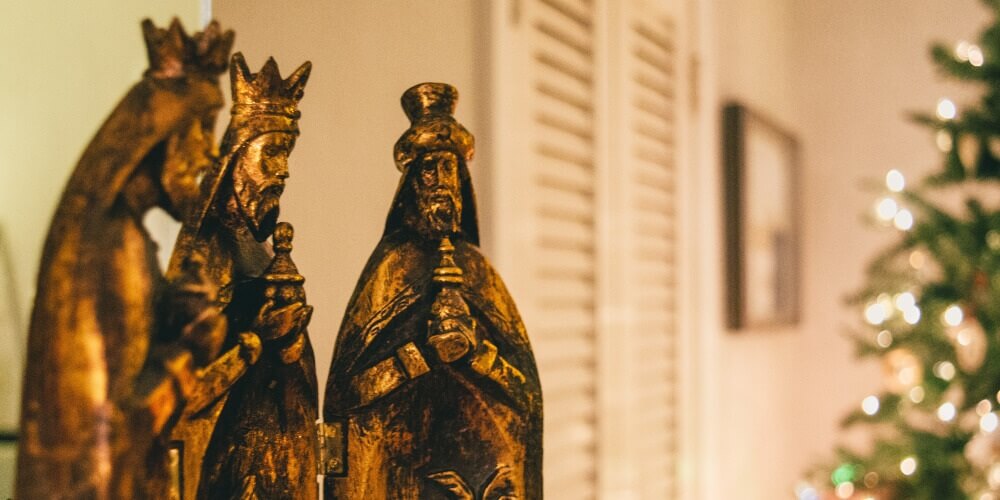![The O Antiphons: An Ancient Cry For A Present Christ [Listen and Read]](https://www.goodcatholic.com/wp-content/uploads/2022/12/the-o-antiphons-ancient-cry-present-christ.jpg)
From December 17th through December 23rd, the Church sings the “O Antiphons” during Vespers. These beautiful verses are helpful in preparing us for the coming of Christ at Christmas.
Antiphons are sung during the Mass and the Liturgy of the Hours throughout the entire year, but many of us are unfamiliar with the term “antiphon.” Moreover, what distinguishes the “O Antiphons” from an ordinary antiphon? And where does the imagery of the O Antiphons come from?
The word antiphon comes from the Greek word ἀντίφωνον, which means “sounding against” or “singing opposite.” An antiphon is “a short chant in Christian ritual, sung as a refrain.” When religious orders of monks or nuns recite the Liturgy of the Hours, for example, they are divided into two choirs which take turns reciting the psalms and antiphons to each other.
In our present liturgy, an antiphon consists of one or more psalm verses or sentences from Holy Scripture which are sung at various times throughout Matins, Vespers, and the Mass. An antiphon usually serves as a means to better understand the corresponding readings for that day.
So what are the “O Antiphons” and why are they special? These seven antiphons are prayed immediately before the Magnificat during Vespers the week before Christmas. Each antiphon begins with the exclamation “Oh!” which is why they are popularly called the “O Antiphons.”

These beautiful verses are magnificent theology. Using biblical imagery drawn from the messianic hopes of the Old Testament, the O Antiphons proclaim the coming Christ as the fulfillment not only of Old Testament hopes, but our present desires as well. Their repeated use of the desperate cry of “Come!” embodies the perennial longing for Our Savior.
As these antiphons are sung in preparation for Christmas, the imagery calls to mind Old Testament passages that speak of the coming of the Savior. The rich biblical elements not only serve to anticipate our forthcoming Savior, but also reveal characteristics of the New Testament Christ. Each antiphon reveals to us the power and goodness of the One Who is to come.
Since we know that God—Who exists outside of time—entered into time at the Nativity of Christ, the O Antiphons do not remain strictly wrought with longing, but rather, they anticipate Christ’s ready response to our cries.
In fact, Our Lord’s answer is included within the O Antiphons as an acronym. If you take the first letter of each Latin title, beginning with the last (Emmanuel) and working backward to the first (Sapientia), it spells ERO CRAS, which means “Tomorrow I will come” in Latin! Even in the depths of Advent, buried amongst our longing and anticipation, we are gifted with the certainty of Christ’s coming.
As you begin your final preparations for Christmas, consider praying the O Antiphons. Alongside beautiful chant renditions of these antiphons, graciously shared with us by St. Joseph College Seminary, we have collected short verses from Scripture that correspond with each day’s antiphon. We have also written some meditations for you to accompany them.
Let the beauty of the biblical imagery draw you deeper into the Mystery of the Incarnation.
December 17th: O Sapientia (O Wisdom)
O Wisdom of our God Most High,
guiding creation with power and love:
come to teach us the path of knowledge!
The spirit of the Lord shall rest on him, the spirit of wisdom and understanding, the spirit of counsel and might, the spirit of knowledge and the fear of the Lord. His delight shall be in the fear of the Lord.
Isaiah 11:2-3
King Solomon was praised for his decision to request wisdom when he could have requested power, strength, cunning, or any other enticing or beneficial gift. We, too, are given the opportunity to seek wisdom. His request was praiseworthy precisely because it recognized the limits of our earthy wisdom; King Solomon’s wisdom was not obtained through books or travel.
Rather, it was a wisdom bestowed on him from heaven. After the Incarnation, the gift of wisdom is not one reserved for kings or prophets, but it is a gift given freely to all through the sacraments. At Confirmation, we are endowed with the gifts of the Holy Spirit, including the gift of wisdom.
As the days begin to become darker and shorter, we can feel as though the world is darker, smaller, and less full of wonder. But wisdom tells us otherwise. Wisdom teaches us that there is a true Light to come and that darkness will not prevail against it. We need not fear the terror of the night, nor the arrow that flies by day. Like King Solomon, let us seek the wisdom necessary to prepare for our Savior. In our mortal lives, our wisdom will lead us to the recognition that true wisdom will only be found in the Eternal Father, Who is Wisdom Itself.
Like the Antiphon suggests, let us cry out for wisdom!
December 18th: O Adonai (O House of Israel)
O Leader of the House of Israel,
giver of the Law to Moses on Sinai:
come to rescue us with your mighty power!
His delight shall be in the fear of the Lord. He shall not judge by what his eyes see or decide by what his ears hear, but with righteousness he shall judge for the poor and decide with equity for the oppressed of the earth; he shall strike the earth with the rod of his mouth, and with the breath of his lips he shall kill the wicked. Righteousness shall be the belt around his waist and faithfulness the belt around his loins.
Isaiah 11:3-5
My friends, if anyone is detected in a transgression, you who have received the Spirit should restore such a one in a spirit of gentleness. Take care that you yourselves are not tempted. Bear one another’s burdens, and in this way you will fulfill the law of Christ. For if those who are nothing think they are something, they deceive themselves.
Galatians 6:1-3
The Hebrew word Adonai translates to “My Lord.” God, our Lord, Lawgiver, and Ruler, will become a helpless baby, needing to be swaddled. Not only was there no castle and throne awaiting Him, there was no room at all. Turned away and left out in the cold, Our Lord was born in a stable and cradled in a manger.
Yet Isaiah’s prophecies depicting a leader and giver of laws remain true. Christ came, not to govern any earthly principality or nation, but to lead our hearts. His laws orient us to love, His judgment is not exercised “by what his eyes see” nor decided “by what his ears hear.” Rather, “with righteousness he shall judge the poor.” Knowing that we need one another to help us with our weary load, Christ brings us a law that asks us to “bear one another’s burdens.”
We are broken. We are sinners. We are in need of a Savior and a King to guide us. Christ does this and more. His mighty power is not seen in the drafty halls of great kings, but in its purest form on the Cross. Like Moses in battle, Christ stretched His arms out to us on His Cross. But unlike on Mount Sinai, Christ the Lawgiver is not shrouded by clouds, but comes to us directly in the frailty of our humanity.
In these final days before Christmas, let us reflect on our need for Christ’s rule and His laws. Let us cry out for Our Lord!
December 19th: O Radix Jesse (O Root of Jesse)
O Root of Jesse, come.
This ensign raised for all to whom the nations pray,
before whom kings keep silent: to rescue quickly come.
A shoot shall come out from the stump of Jesse, and a branch shall grow out of his roots. On that day the root of Jesse shall stand as a signal to the peoples; the nations shall inquire of him, and his dwelling shall be glorious.
Isaiah 11:1,10
The root of Jesse shall come, the one who rises to rule the Gentiles; in him the Gentiles shall hope.
Romans 15:12 (referencing Isaiah 11)
Throughout each winter, we tread upon the hard ground with little thought of whether it will ever grow fertile and full again. We become so accustomed to the cold, that sometimes it is difficult to remember the warmth of the spring or the weight of the summer. When—out of current desperation or remembrance of past warmth—we do consider the greenery to come, is it not true that we never truly anticipate the fullness of bloom? It seems that every summer, the lush leaves and the expansive shade cast by them take us by surprise.
So too with Christ. We tread upon the barren soil of our souls and cannot even begin to consider what could possibly grow there. Any thoughts on the matter seem naïve and exaggerated.
Yet, from an unseen root, there will bloom a transformative Savior. He comes to us, small and feeble, a child in a manger. When Christ appears, He is like a late winter sprout, much smaller than the grand blooms of August, seemingly weaker and more vulnerable. But His power is far, far greater than any of those who preceded Him. It is with a frail hope that we cry alongside the antiphons for the Root of Jesse! Even our wildest hopes could never anticipate the gift that is to come!
December 20th: O Key of David (O Clavis David)
O Key of David,
opening the gates of God’s eternal Kingdom:
come and free the prisoners of darkness!
For a child has been born for us, a son given to us; authority rests upon his shoulders; and he is named Wonderful Counselor, Mighty God, Everlasting Father, Prince of Peace. His authority shall grow continually, and there shall be endless peace for the throne of David and his kingdom. He will establish and uphold it with justice and with righteousness from this time onward and forevermore.
Isaiah 9:6-7
And to the angel of the church in Philadelphia write: These are the words of the holy one, the true one, who has the key of David, who opens and no one will shut, who shuts and no one opens: “I am coming soon; hold fast to what you have, so that no one may seize your crown. If you conquer, I will make you a pillar in the temple of my God; you will never go out of it. I will write on you the name of my God, and the name of the city of my God, the new Jerusalem that comes down from my God out of heaven, and my own new name.
Revelation 3:7, 11-12
Traditionally, a key is a symbol of authority. Consider Christ handing over the keys to St. Peter, symbolizing the institution of the papal authority on earth.
In a monastery, there is great significance to the transition of keys to the new abbot. When one has the keys to a home or place, they inherit the authority to lock or unlock the entrance depending on who knocks at the door. In this way, they also inherit a responsibility to keep the place safe, protected from unwanted intruders, and shut off from the erosive elements.
With Christ, we find the ultimate Authority, yet the most merciful Gatekeeper. We are reminded that all we need to do is “knock and the door shall be opened unto you” (Matthew 7:7). Not only is it through Christ that we come to enter the kingdom of Heaven, but we also find that He is the Key that will unlock the chains of sin that bind us and the prisons of darkness that trap us!
December 21st: O Oriens (O Radiant Dawn)
O Radiant Dawn,
splendor of eternal light, sun of justice:
come and shine on those who dwell in darkness and in the
shadow of death.
But there will be no gloom for those who were in anguish. In the former time the Lord brought into contempt the land of Zebulun and the land of Naphtali, but in the latter time he will make glorious the way of the sea, the land beyond the Jordan, Galilee of the nations. The people who walked in darkness have seen a great light; those who lived in a land of deep darkness—on them light has shined.
Isaiah 9:1-2
And you, child, will be called the prophet of the Most High; for you will go before the Lord to prepare his ways, to give knowledge of salvation to his people by the forgiveness of their sins. By the tender mercy of our God, the dawn from on high will break upon us, to give light to those who sit in darkness and in the shadow of death, to guide our feet into the way of peace.
Luke 1:72-79
Christ declares Himself both the Light and Life (John 8:12, John 11:25). Christ is like the sun—without Him we would have neither light nor life. But unlike the sun, whose rays shine on us only intermittently, Christ’s radiance shines forth eternally and cannot be hindered.
Rather than depicting Christ as the midday sun, the antiphons call out for the coming of a radiant dawn. This dawn is gentle and hints at something greater to come. Unlike the full-noon sun, we can gaze upon the dawn without being blinded. The morning sun is not merely gentler than the midday sun, but it is lovelier: painting the sky and all that gaze upon it with majestic colors and warm hues. Moreover, the brilliance of the dawn is but the beginning, for we know that the sun is going to rise more fully and shine brighter.
With the coming of Christ, He teaches us that there will be a time when He will come again and those faithful to Him will be able to finally gaze upon His brilliance. As the radiant dawn of Christmas begins to rise against the horizon, allow Christ’s light to fall upon you and color you a warmer and more brilliant color. Let the sun that begins to fill the horizon fill your heart with hope and anticipation, not just for the coming of Christ at Christmas, but for His Second Coming at the end of time.
Let there be no hidden darkness within you: open your hearts up to Christ and allow Him to illuminate every part of you! There is no amount of sin and darkness that can withstand His light!
December 22nd: O Rex Gentium (O King of Nations)
O King of the nations and Desired of all,
You are the cornerstone that binds two into one:
Come, and save humankind whom You formed out of clay.
Therefore thus says the Lord God, “See, I am laying in Zion a foundation stone, a tested stone, a precious cornerstone, a sure foundation: ‘One who trusts will not panic.’ And I will make justice the line, and righteousness the plummet; hail will sweep away the refuge of lies, and waters will overwhelm the shelter of falsehood.”
Isaiah 28:16-17
Christ came to unite all of mankind. Giving to us a universal Church, He created an earthly home for all people.
At Christmas, this reality of home is more palpable to us. Those who are able travel from far and wide to return home. Those who, for a variety of circumstances, cannot return home, feel the absence of home deeply. Imagine Joseph and Mary, in the middle of preparing a home for Christ, having to be pulled away from their home to journey to Bethlehem. Christ was born away from His home, far from any semblance of even a house, and was brought into this world in a stable.
After His birth, the Holy Family was forced to flee to Egypt, a foreign country with unfamiliar people and customs. When He began His public life, He was turned away from His home of Nazareth, rejected by His own people. Christ was turned away from His earthly homes, so that we would always be at home. In the Church, He has given us a universal home, a place where all can come and find rest. With Christ as King of Nations, no longer must we make a long political trek to our homelands, but must only turn our hearts to Christ.
He will lead you home, to the Church, to a people looking not for earthly power but for a Divine Love. This love is not reserved for a chosen people or constrained to a particular tribe, but with Christ as King of Nations, this love is given freely to all. Out of love, Christ was rejected from every home so that all may be at home in Him.
December 23rd: O Emmanuel
O Emmanuel, our King and Lawgiver,
the Expected of Nations and their Savior:
come, and save us, O Lord our God!
“Therefore the Lord himself will give you a sign. Look, the young woman is with child and shall bear a son, and shall name him Immanuel.”
Isaiah 7:14
It is difficult to put into words. Words themselves fail. Creator and created. Immortal and mortal. God and man. These words themselves suggest an insurmountable distance. Yet Emmanuel declares these paradoxes naught. God is with us.
With the coming of Christmas, we are forced, yet again, to face the Mystery of the Incarnation. Emmanuel suggests an entirely new idea. An idea that could never be reasoned to. One cannot reason to the Incarnation, it goes beyond all capacities of one’s intellect, one’s heart, and one’s body. The reality of the Incarnation forces us to recognize the limits of our own understanding.
Although a difficult one, this realization, if held with the reverence it warrants, combats the inclination and habit of the soul that desires to self-create and to act like God in the role of author of our lives. This is one of the gifts of Christmas: the gift of identity. We do not have to self-create the meaning in our lives; rather, we receive the fulfillment of meaning with Christ becoming man and granting our very flesh, which is subject to decay and disease, the dignity of sharing in His divinity. God is with us, sharing the hardships of humanity in His own flesh, dwelling not in a temple spiritually, but as flesh and blood among humanity, wishing to remain with us until the end of time.
This last great antiphon brings to a head the tension of Advent: the reality that we are awaiting One Who we know has already come and will come again.
Advent, with its insistence that we prepare for One we know has come, forces us to acknowledge the mystery of time itself. It also calls us to prepare for the day when Christ will come again and time itself will end.
Throughout Advent, as the days become shorter and colder, we feel our hearts swell with hope. Advent gives us the twofold gift of preparing our hearts for Christ while also recalling that His Incarnation is a reality for us always—and that one day, He will come again in glory.






